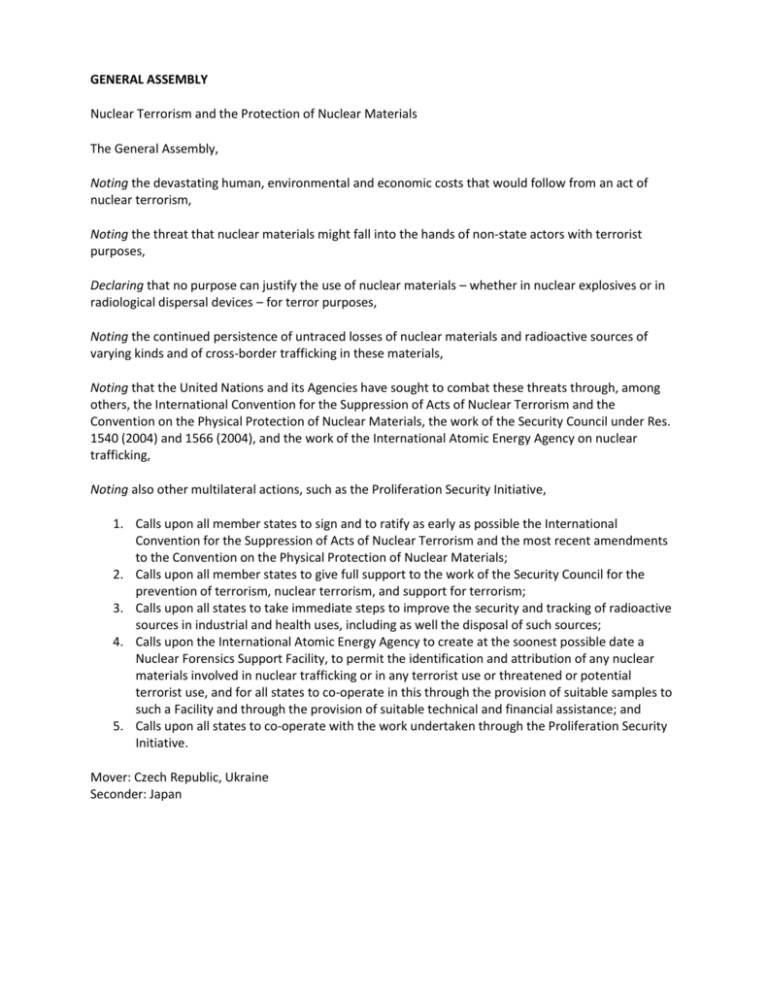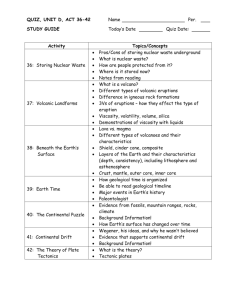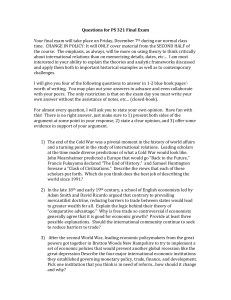GENERAL ASSEMBLY Nuclear Terrorism and the Protection of
advertisement

GENERAL ASSEMBLY Nuclear Terrorism and the Protection of Nuclear Materials The General Assembly, Noting the devastating human, environmental and economic costs that would follow from an act of nuclear terrorism, Noting the threat that nuclear materials might fall into the hands of non-state actors with terrorist purposes, Declaring that no purpose can justify the use of nuclear materials – whether in nuclear explosives or in radiological dispersal devices – for terror purposes, Noting the continued persistence of untraced losses of nuclear materials and radioactive sources of varying kinds and of cross-border trafficking in these materials, Noting that the United Nations and its Agencies have sought to combat these threats through, among others, the International Convention for the Suppression of Acts of Nuclear Terrorism and the Convention on the Physical Protection of Nuclear Materials, the work of the Security Council under Res. 1540 (2004) and 1566 (2004), and the work of the International Atomic Energy Agency on nuclear trafficking, Noting also other multilateral actions, such as the Proliferation Security Initiative, 1. Calls upon all member states to sign and to ratify as early as possible the International Convention for the Suppression of Acts of Nuclear Terrorism and the most recent amendments to the Convention on the Physical Protection of Nuclear Materials; 2. Calls upon all member states to give full support to the work of the Security Council for the prevention of terrorism, nuclear terrorism, and support for terrorism; 3. Calls upon all states to take immediate steps to improve the security and tracking of radioactive sources in industrial and health uses, including as well the disposal of such sources; 4. Calls upon the International Atomic Energy Agency to create at the soonest possible date a Nuclear Forensics Support Facility, to permit the identification and attribution of any nuclear materials involved in nuclear trafficking or in any terrorist use or threatened or potential terrorist use, and for all states to co-operate in this through the provision of suitable samples to such a Facility and through the provision of suitable technical and financial assistance; and 5. Calls upon all states to co-operate with the work undertaken through the Proliferation Security Initiative. Mover: Czech Republic, Ukraine Seconder: Japan ECONOMIC, SOCIAL, CULTURAL AND HUMANITARIAN COMMITTEE Rebuilding Somalia The General Assembly, Noting the ongoing conflict in Somalia and the great human costs that this has inflicted on he people of that state, Recognizing the limited success of previous United Nations efforts to restore international peace and security in Somalia and to provide effective humanitarian assistance, Welcoming recent efforts by the African Union to assist in restoring peace in Somalia, and Acknowledging requests by the African Union for broader United Nations assistance in its efforts, 1. Calls upon the Secretary General of the United Nations to re-invigorate his efforts to find a political solution to the ongoing civil strife and humanitarian crisis in Somalia; 2. Calls upon all states to co-operate in these efforts, including through: a. providing timely and adequate assistance to the efforts of the African Union; b. taking steps to cut off flows of arms and other resources, including financial support, to groups in opposition to the Transitional Federal Government of Somalia; c. supporting increased efforts by the United Nations Humanitarian Coordinator for Somalia to provide adequate relief; and 3. Calls upon all factions in Somalia, including the Transitional Federal Government, to remove obstacles to the provision of adequate humanitarian relief. Mover: Uganda, Kenya Seconder: Djibouti, Somalia POLITICAL, SPECIAL POLITICAL AND DISARMAMENT COMMITTEE Call for a Moratorium on Arctic Claims The General Assembly, Noting that the United Nations Convention on the Law of the Seas provides both a basis for advancing claims to national Continental Shelves and a mechanism for the peaceful making and resolution of claims in the Commission on the Limits of the Continental Shelf, Noting that claims for a Continental Shelf beyond the basic 200 nautical mile limit should be supported by appropriate scientific evidence, Noting that the obtaining and sharing of scientific information about the geology of the Arctic seabed is in the general interest of the international community, Concerned that the premature advancing of claims to the Arctic seabed beyond the minimum 200 nautical mile limit may hinder co-operation in Arctic issues more generally, 1. Calls upon all states with continental shelf claims in the Arctic to observe a moratorium on such claims beyond the 200 nautical mile limit pending a resolution of the question by the Commission on the Limits of the Continental Shelf; 2. Calls upon all such states to co-operate fully in the development and sharing of geological data concerning the Arctic seabed; 3. Calls upon all such states to co-ordinate in the presentation of their claims and the supporting evidence at an agreed date before the Commission on the Limits of the Continental Shelf; 4. Recalls that all areas of the deep ocean floor beyond national jurisdiction are part of the Common Heritage of Mankind, and therefore fall under the appropriate authority of the International Seabed Authority created under the United Nations Convention on the Law of the Sea. Mover: Norway, Finland Seconder: Denmark, Canada HUMAN RIGHTS COUNCIL Implementation of the Declaration on the Rights of Indigenous Peoples The General Assembly, Noting the long-standing efforts of United Nations bodies to protect the rights of the world’s indigenous peoples, Noting the declarations by the General assembly of two International Decades of the World’s Indigenous Peoples, Noting the adoption by the General Assembly of the United Nations Declaration on the Rights of Indigenous Peoples in 2007, 1. Notes that the Declaration itself provides no explicit mechanism for oversight or implementation; 2. Notes that issues concerning the rights of indigenous peoples fall within the mandate of the Human Rights Council; 3. Calls upon the Human Rights Council to ensure that reports concerning the implementation of the Declaration are part of its normal work; and 4. Calls upon the Human Rights Council to ensure that concerned indigenous peoples should be given opportunities to provide information o the Council to assist in the performance of its duties. Mover: Bolivia, El Salvador Seconder: Cuba, Tanzania, Ethiopia






